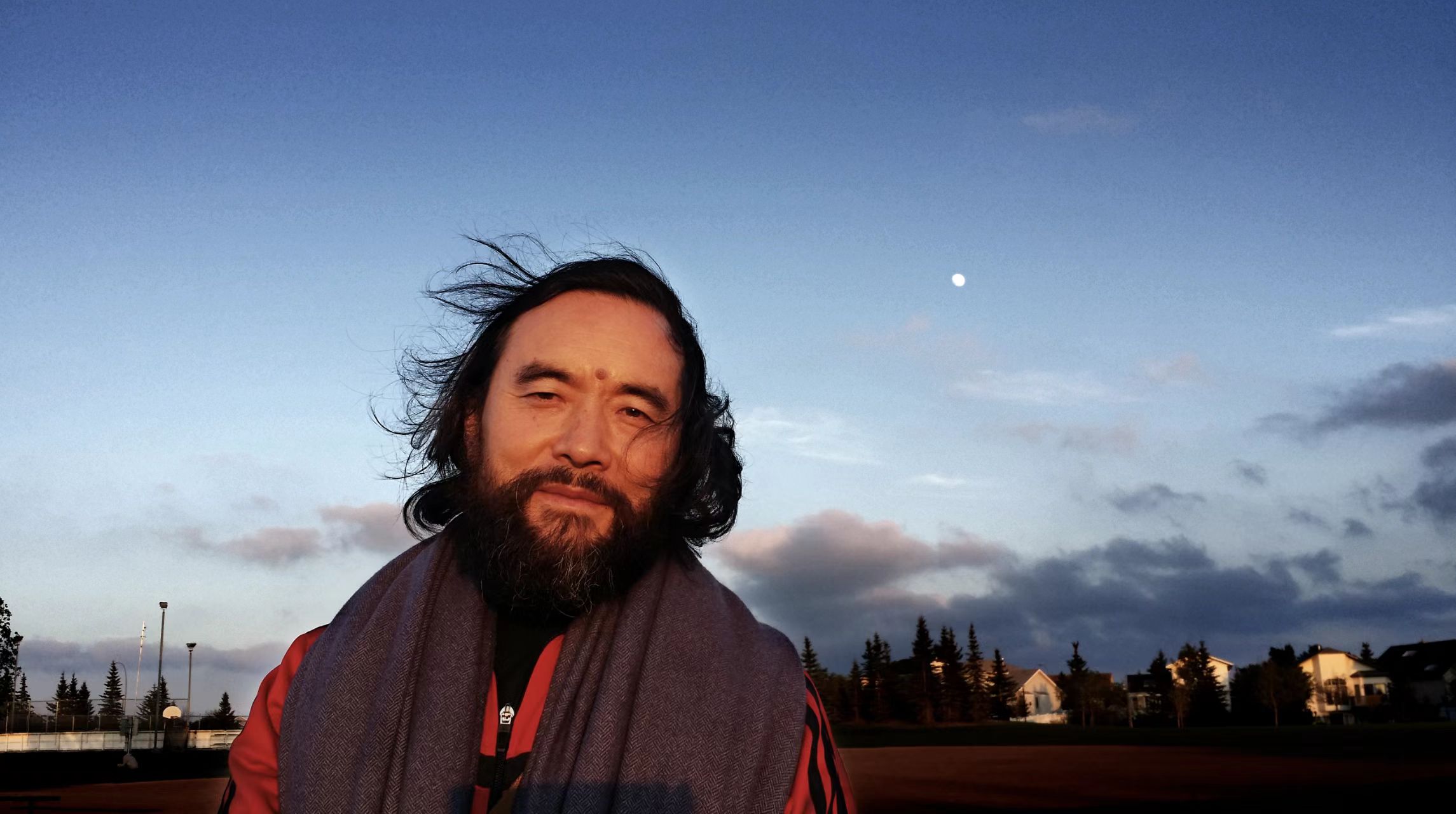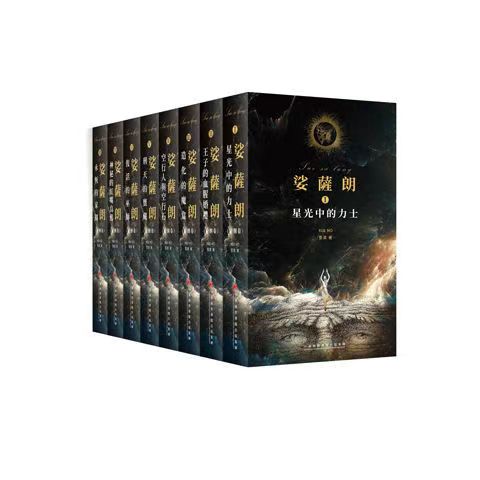
Xuemo and His Light
By Anuo
Xuemo, born in China's far west, is a writer who plumbs the earth with his footsteps and lives through his pen. A favorite son of the Qilian Mountain Range, he has fashioned his life and his aspirations out of the natural scenery and musical traditions of the place. He travels far in the fulfillment of his dreams and never stops searching; he wields a pen to memorialize his hometown and writes with passion. The wisdom flowing from his fingertips lights up the hearts of countless readers.
Xuemo, the penname of Chen Kaihong, is the author of Desert Rites, Desert Hunters, White Tiger Pass, Wild Fox Ridge, The Curse of Xixia, Songs of Liangzhou, The Sound of Broadbeans Late at Night, and, The Monk and the Spirit Woman, as well as Suosalang, an epic poem. His works have won major prizes in China, including the Feng Mu Literary Award, the Shanghai Novel and Novella Prize. In 2015 he was named one of China's Ten Persons of the Year, and has served on the faculty at Fudan University, Shanghai University of Traditional Chinese Medicine, and Guangzhou University of Foreign Studies. Six of his novels, as well as the epic poem, have been rendered into English by the award-winning team of Howard Goldblatt and Sylvia Li-chun Lin. Besides English, Xuemo's works have also appeared in French, German and more than three dozen other languages, reaching a large international readership. Domestically, he has legions of devoted followers and a corpus of more than a hundred published works.
Xuemo was born in a remote, impoverished village threatened by blowing sand and perennial drought. When he was a child, not a single book, other than school textbooks, could be found in his village; hunger was constant, and undernourishment stunted his growth. And yet, he dreamed of becoming a writer. How could a child with nothing make the dream come true? No one in and outside his family could help him, and he had none of what was needed to succeed. He saw not a shred of hope.
One day, his maternal uncle said to his parents,
"Plant a long pole in your yard and put a light on its tip. Every day at nightfall, turn the light on and silently recite, 'The enlightened exert themselves constantly/the virtuous endure onerous duties.' Keep at it and one day someone in your family will gain fame."
Xuemo's parents, born of peasant stock and illiterate, believed what his uncle told them. They cut down a small tree in the riverbend, stripped its leaves, and planted it in their yard. The pole rose into the sky among squat rammed-earth houses, its tip adorned with a light that was turned on each evening. The electricity for the light was a major expense and a burden to a family with practically nothing, but it kept coming on night after night for years. The sky always seems higher in the west than elsewhere; at night it is a deep, black curtain dotted with stars that emit cold glints, distant and unreachable. But not the light in the yard that emitted a ray of hope and sent warmth into a child's heart.
That light shone all through Xuemo's childhood, saw him into puberty and adulthood. He saw hope whenever he looked at it.
The light in his heart set off against the light in the night sky to shine a way for this tenacious village boy to grow up.
Under its light, Xuemo exerted himself unceasingly and endured onerous burdens. Day after day, for decades.
It was his companion as he grew up.
In 2000 the publication of Desert Rites brought him instant fame and recognition. Desert Hunters and White Tiger Pass followed, both to critical acclaim, widely considered as representative works of China's Nativist literary tradition. Collectively titled The Desert Trilogy, they were begun when he was twenty-five and completed at forty-six; he'd given twenty of his best years to China's peasants through the three volumes.

The publication of three more works, The Curse of Xixia, Wild Fox Ridge, and The Monk and the Spirit Woman, established him as an important figure in contemporary Chinese literature as well as an essential presence in the literary representation of China's West. Lei Da, president of the Chinese Fiction Society and a well-respected literary critic, once said, "Xuemo's appearance was a unique literary phenomenon, for he represented a kind of culture, a zeitgeist, human dignity, and an ideal. It was a miraculous occurrence, for he gained great insights from delving deeply into the mentality and temperament of Chinese peasants. The powerful force exhibited in his works is beyond the ability of many Chinese writers." Professor Chen Sihe at Fudan University had the following to say, "Xuemo and Zhang Chengzhi are the two most spiritual writers from the west," and "he carries on the vitality seen in the work of Xiao Hong." Chen Xiaoming of Peking University lamented that "Xuemo is a severely undervalued writer," who is "a major figure in contemporary Chinese literature."
With his pen as a banner, Xuemo trudged out of his village into urban areas, that light shining bright in his heart the whole time.
The light is the totem of his life, always aglow, wherever he may be at whatever time.
Under the light, he has ceaselessly exerted himself, completing True Heart, Beyond Emptiness, Guru's Secrets, An Outline of Xuemo's Study of the Mind, A Study Guide for Cultural Transmission, and others. Encyclopedia of China Publishing House, an influential press, established a special division for Xuemo's works and published a series of his writing on the mind. Meanwhile, Xuemo has himself become a light for many people through his study of the mind. His works light up many people's lives. Where there are ethnic Chinese, there will be books by Xuemo, and special division on Xuemo can be found in the US, Canada, Europe, and Southeast Asia.
Tan Xiyong, a Canadian expert on Buddhism has called Xuemo's Beyond Emptiness the best writing on Buddhism in the last hundred years and beyond. Moreover, his Buddha's Wisdom is considered by experts in the field as the most profound work ever in the analysis and interpretation of Buddhist theory and practice.
His Suosalang, an epic poem in eighty thousand lines and over a million words, emerged from his own study and lifelong practice. It helps fill in the lack of epic poetry in Chinese literary history. According to a scholar, it is a fantastic and yet extremely realistic epic poem that depicts an expansive, impactful, and emotionally moving battle of destinies, a colorful scroll that weaves together the conflict between good and evil, love and spiritual devotion, exploits and ordinary life, war and peace, self and Universal Love, a long journey that exposes human nature, helps cleanse the soul, and shines a bright light on life, a divine work no one should miss. One authority has grouped Suosalang with A Song of Ice and Fire and Lord of the Rings as the three best fantastic epic poems of the contemporary era.

That is because Xuemo writes with his life, writes about the world and human souls to light up himself and others.
Whenever he encounters setbacks, Xuemo knows he has inexhaustible strength so long as the light in his heart is on.
That light is hope and dreams.
Every one of us needs the light.
All humankind needs the light.
The light may be faint, but it can penetrate the darkest of nights.
Into The Desert in Amazon:
https://www.amazon.com/Into-Desert-Xuemo/dp/1592652549/ref=sr_1_1?keywords=into+the+desert+xuemo&qid=1676602370&sr=8-1
Xuemo Culture Network :
www.xuemo.cn
www.xuemo.com
Emaill: xuemo1963@163.com
AP reporting:
https://apnews.com/press-release/ein-presswire-newsmatics/books-and-literature-ein-presswire-newsmatics-china-entertainment-5b66ccc9f5889f12f34f3a4417537e35